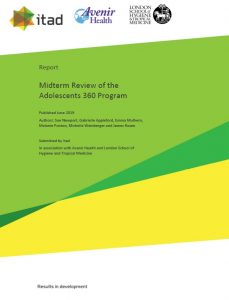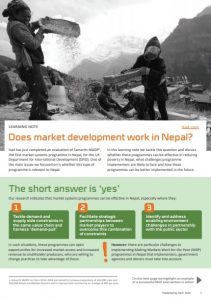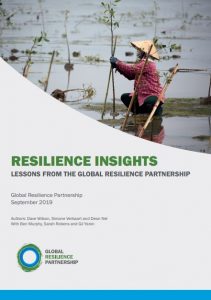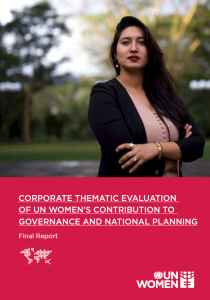Our practices have had a productive year, continuing to support clients to deliver results in development.
We have started work on exciting new projects, hired some fantastic new staff and put a lot of effort into sharing what we have learned. Here are the highlights for the year, picked by our practice leads.
Human Development
It has a been a really great year for our Human Development practice, now comprising a diverse team of 14 who reportedly speak over 11 languages between them! Our portfolio of 26 projects now spans work across (but isn’t limited to) sexual and reproductive health (SRH), health security and education.
 We continue to contribute to understanding what works, why and for whom in SRH programming, as evaluators of Adolescents 360, we have developed thinking around resilience and SRH provision in fragile settings. We have begun work as Third Party Monitor (TPM) and learning partner for DFID on its flagship WISH programme, which focusses in particular on SRH for vulnerable populations including people with disabilities and those living in poverty.
We continue to contribute to understanding what works, why and for whom in SRH programming, as evaluators of Adolescents 360, we have developed thinking around resilience and SRH provision in fragile settings. We have begun work as Third Party Monitor (TPM) and learning partner for DFID on its flagship WISH programme, which focusses in particular on SRH for vulnerable populations including people with disabilities and those living in poverty.
Our growing global health security portfolio now includes our work with the Fleming Fund as evaluation and learning partner, as well as two new projects with the Wellcome Trust (focused on antimicrobial resistance), Public Health England (International Health Regulations) and UK PHRST (epidemic response). We are building strong expertise in the evaluation of work on neglected tropical diseases, as evaluators of ACCELERATE for CIFF, as well as our role as TPM and evaluator for DFID’s ASCEND programme.
On the education side, we continue to support the long-term Global Partnership for Education evaluation (read their country-level evaluations published in March 2019), and undertook our first pro bono project with the Pepal Foundation supporting their development of a theory of change.
Fragile and Conflict-Affected Settings (FCAS)
Itad’s FCAS practice continues to provide Monitoring, Evaluation and Learning (MEL) support to the UK Conflict, Stability and Security Fund (CSSF) across more than 20 countries in four regions. Recent highlights include evolving our approach to measuring political access and influence (PAI) to helping CSSF teams in Eastern Africa and our work in Middle East, North Africa and the Caribbean that demonstrate the impact and value of blending developmental activity with diplomatic action.
We presented our findings at the annual CSSF lessons conference, alongside our work on managing transition and exit in CSSF programming. We also tested and finalised our approach to measuring the effectiveness and value of military training in Eastern Africa, and our evaluative work on support to local and national peace processes in Sudan and South Sudan has generated important insights for future UK support.
We completed an evaluation of coverage and quality in UNICEF’s humanitarian assistance, making recommendations that are being used by UNICEF to improve programming in complex situations. We recently started evaluations of Sida’s strategic partnerships for humanitarian assistance and UNHCR’s operations in four countries. Also, as part of our MEL support to DFID’s Global Mine Action Programme, our research on the enablers and inhibitors to evidencing how mine action contributes to longer-term development has helped convene donors, implementers and academics to improve the sector’s understanding of this issue.
Inclusive Growth
The second half of 2019 saw the practice take on some exciting new work and make some important knowledge contributions to the field.
We’ve completed the evaluation of the UK Department for International Development (DFID) FoodTrade East and Southern Africa Programme (FTESA). You can learn more about the programme and the lessons we learnt in this blog.
We’ve also delivered the final Evaluation of the Samarth-Nepal Market Development Programme and published a Learning Note on the findings. Finally, the final evaluation of the Nepal Rural Access Programme (RAP) is now complete, ongoing since 2013. Check out a great range of relevant resources available on the RAP project page.
A big priority for the practice has been understanding how we can support investors and companies to understand and improve their impact. You can read more about our offer to business in this 60 second interview with the Inclusive and Sustainable Business theme.
On the conference front, together with the IFC we co-hosted a panel session at the Social Capital Markets conference (SOCAP) that explored how investors can undertake independent verification of their commitments to the operating principles for impact management.
Other highlights include:
- Ed Hedley made important contributions around complex systems thinking at UKES and shared his thoughts in a blog.
- Helen Bailey discussed our findings on youth financial inclusion in a blog, building on work with the Mastercard Foundation.
Our priority for 2020 remains to work with clients to maximise the impact of flagship investments including the 10-year study of CDC, with the Sustainable Urban Economic Development (SUED) for DFID Kenya and strategic support to the Gatsby Foundation.
Climate Change, Social Protection and Livelihoods
The Climate Change theme has been busy in 2019, making contributions to the field of resilience MEL by demonstrating what is working for resilience and what this can tell us about future programme design.
One of our proudest moments in 2019 was winning the IDEAS award for influence for our work on the evaluation of Transformational Change in the Climate Investment Funds (CIF). Lead by Itad, the evaluation culminated in a final report launched at the ‘Power of 10: Shaping the Future of Climate Action’ summit in January 2019 and received a great deal of attention. We were excited to participate in the UN Climate Action Summit in New York in September, sharing evidence from the GRP Resilience Insights Report to highlight nuance in the role of context in dampening or enhancing resilience-building from across 42 different programmes. We’ve also been working on the BRACED extension, which delved deeper into critical questions around sustainability, equality, adaptive management and policy change.
In Agriculture, we are delivering a high-profile mid-term evaluation of the Alliance for the Green Revolution in Africa (AGRA) and its Resource Partners. The review is helping to strengthen AGRA’s internal processes in implementing its five-year strategy, as well as make recommendations to the Resource Partners on longer-term focus in African agriculture.
In WASH, we continue to demonstrate the value of robust monitoring systems for programme management, through leading the independent monitoring and verification of two global DFID-funded programmes. We’ve also been undertaking a global evaluation of UNICEF’s WASH programming in protracted crises.
Governance and Institutional Strengthening
There’s been a lot of highlights this year and we have a lot to be proud of. Through our work on DFID’s Anti-Corruption in Nigeria programme we have supported important adaptations to the programme, such as focus on corruption in the private sector and investigative journalism.
We continued to strengthen our work on gender policy evaluations. Our evaluation of UN women’s contribution to governance and national planning was published, while similar evaluations with GAVI and WFP will come out in the new year. Encouragingly, we have heard that UN women is already implementing several of our recommendations.
We published a learning paper and blog based on the work we have been doing with BMGF to support six advocacy organisations to strengthen their monitoring, evaluation and learning (MEL) capacities and practices.
Our work on adaptive management has continued apace. Through our collaboration with A4EA we published a synthesis report for three case studies of large DFID governance projects in Myanmar, Nigeria and Tanzania that have adopted an adaptive management approach. Reflecting on a number of recent contracts we produced a blog on how to design and deliver rapid evaluations to support adaptive management. We also deepened our experience with supporting donors in operationalising adaptive management at the portfolio level and published a blog distilling our learning.
We continued to develop our expertise around research impact and evidence informed policy making. Our five-year evaluation of DFID’s £54.6 million Humanitarian Innovation and Evidence Programme, was finally made public, as was our evaluation of the set-up of the UK government’s 1.5bn investment in development research – the Global Challenge Research Fund. We also produced a final synthesis report that distils key lessons on how to institutionalise evidence informed priority setting in health based on our 4 year learning partnership with the International Decision-Making Support Initiative.
In the new year we will be starting work on several projects focused on modern day slavery. So, watch out for our insights and learning next year on what works in this important new area of development policy.

